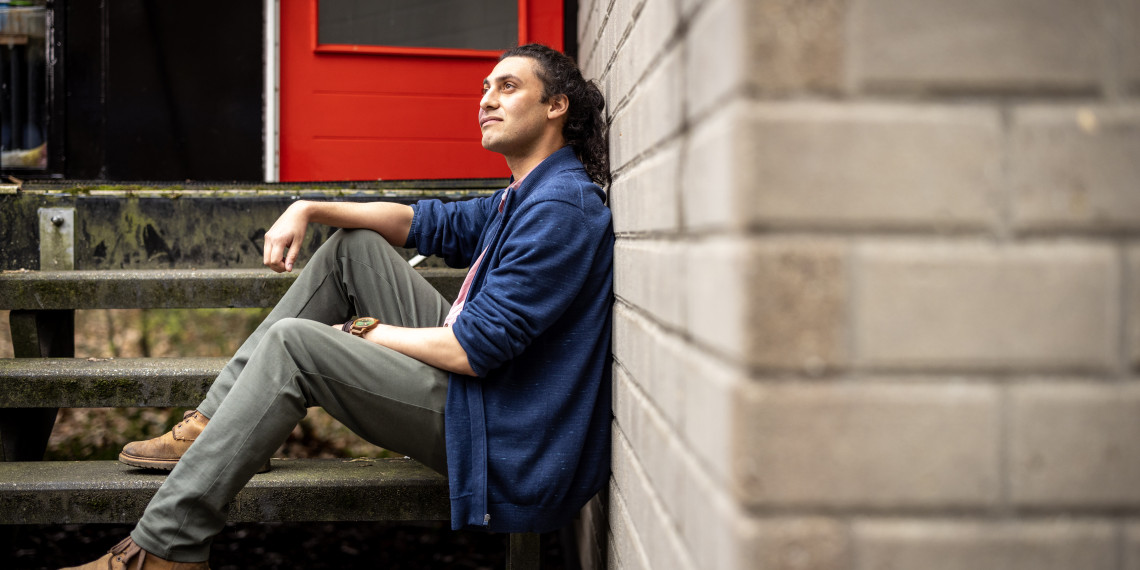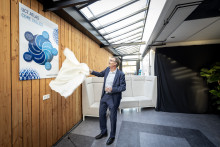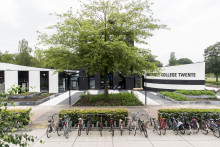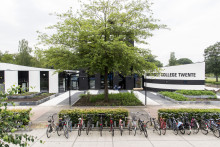Three-part series: the UT students
U-Today had candid conversations with three UT students about their studies, student life, dreams, hopes, and ambitions. This provided a wonderful insight into how they view life. In the first part of this three-part series: Ethan Höfgen.
'Sorry, I'm not done at all. I always leave everything to the last minute, I plan my days too full!' With an apologetic smile, Ethan Höfgen squeezes between a drying rack and a refrigerator in the living room that he shares with five other students. He hurriedly scrubs the patina of countless breakfasts from the dining table. Last night he attended an event on campus, this morning he had a meeting. The Amsterdam bachelor's student makes maximum use of his time in Twente. Since coming to Twente in 2021, he has held a dozen positions on boards and committees, including for the University Council, sustainability association SUSTAIN and study association Atlantis. Enthusiastically: 'I find policy work interesting. I want to make life better for students.'
He devotes about forty hours a week to his studies at ATLAS, the University College of the UT, which requires each participant to tick off sixty credits annually. ATLAS offers a three-year bachelor's degree in which students can create an individual curriculum in natural sciences, social sciences, and mathematics. Höfgen: 'In principle, we can take any bachelor's or master's course, unless there is a numerus clausus or you lack certain prior knowledge.' In 2029, the curtain will fall for ATLAS, and from September 2025 students will no longer be able to apply. 'ATLAS has never been able to support itself financially, mainly because the influx of students was difficult. The marketing of ATLAS is bad, it is seen as a vague, elitist programme, and it costs twice as much as a normal course.' With a laugh: 'Fortunately, my mother and I are good at saving.'
On the edge of the campus, eight of the fifty or so ATLAS students form a close-knit community in the semi-detached student houses around a courtyard - an eighties idyll in grey brick. A swing sways from a bare tree. In the February sun, a barbecue awaits action. Höfgen has been living here since 2022, but he has already moved in and out three times. 'Every summer we have to leave for a big clean-up.' Wryly: 'Not that we notice it much afterwards.'
‘I wanted to become a kind of Einstein, but I had a bad attitude to work’
Actually, it was not obvious that Höfgen would ever enjoy advanced study, he says. 'I started with MAVO. I was one of those nerds who was good at maths, physics, chemistry, biology, but I was also interested in psychology, in how people work and think. I wanted to become a kind of Einstein, but I had a bad attitude to work. I don't have ADHD, but I get distracted easily. In MAVO 2 I was allowed to move on to HAVO 3, but when I went to VWO after my final exams it became difficult. I suffered more and more from fear of failure and got low grades.'
Where did that fear come from?
'During my secondary school years, I developed a great deal of insecurity, because I felt like an outsider socially. I'm not someone who goes along with social media trends. When it came to famous people, I had no idea who they were. Even then, it felt like my mind was older than my body. I hung out with people, but I didn't dare to say much. I was always so scared, and still am a bit: what if I don't fit into this group, what if I'm not good enough at school?'
(Text continues below the picture.)

'I ended up in a cycle of bad grades and fear that things would go wrong again, even if I did my best. I was also very concerned about what was happening in the world. Around the age of 15, we started working on climate change in biology class. I was very concerned with all the inequality in the world, people suffering, nature disappearing. It was all so big, I had to do something about it I thought, but how? I was in high school, I didn't know anything yet. I worried a lot but I didn't talk to anyone about my worries. I kept everything inside and became depressed.'
While it was stormy in his head, it was also restless around him, at home in the Amsterdam suburb of Nieuw-West. His older sister and his mother did not get along, and when Höfgen is seventeen, his parents divorced. More and more often he withdrew with his tablet. 'All that pressure and stress built up inside me. In the beginning, those games were a nice distraction, but soon I was doing nothing else. If my mother asked me to do something around the house, I would react angrily.'
After a fierce argument, his sister left to live with his father and Höfgen was left alone with his mother. 'I got all her emotions and didn't want to abandon her.' As the rift in the family deepened, the years passed without him speaking to his father or sister. 'Sometimes they sent sweet messages: we miss you so much, I hope you have a happy birthday. In the beginning I didn't react, I wasn't ready. Later, so much time had passed that I didn't dare anymore. I knew how much I had hurt them. I had left them in tears. I wanted to see them again, but when I suggested that once, my mother said: 'If you do that, you have to choose between us'.'
‘I thought this is not right, I fit here, I can do this!’
In the midst of that turmoil, Twente beckoned. Höfgen knew the university from stories, because his grandfather once worked in the technical department. In the wake of two friends, he visited an open day. 'Something was missing for me in mostcourses, but when I saw ATLAS, I thought: wow, this is so cool. I applied, but was rejected. The interview had not gone so well. I was mainly technologically oriented and their idea is that you combine that with social insights.'
Höfgen sat at home for a year, with no alternative. He took a temporary job and wrote a new motivation letter. 'I thought this is not right, I fit here, I can do this! I know my grades aren't good enough, but that's because of my worries and my fear of failure.' The second interview was tense. 'The teacher who interviewed me remarked that I had told little about my social life. I said very honestly: 'I'm not a very social person, but I do want to push myself to be more social.' Oh shit, I thought, they're going to reject me on this. But they let me in.'
What do you remember of that first time in Twente?
'It was exciting and fun, finally I was accepted in my dream programme. The campus is beautiful. It's small-scale, you're not seen as a number, you have a name here. The atmosphere is welcoming and open. I also felt nervous, because half of my acceptance letter was about the teachers' concerns, whether I would make it. They are looking for people who are very good at many subjects. I thought: what if they are right? What if I can't handle it? Am I social enough? The first year I was constantly thinking about what I could or couldn't say or ask in a group, and what topics of discussion might be interesting.'
How about now?
'That has changed completely. Because ATLAS is so internationally focused, we have a diverse community that likes to help each other. Everyone talks to each other about all kinds of things, which makes you feel less alone. You realise: oh, I'm not that stupid. Others also have difficulty with this programme, they are sometimes insecure, stressed or depressed. We sometimes joke that we seem like a kind of cult, we are almost a family. Sometimes in the academy building, we talk openly and loudly about sex or make cynical jokes about death. There are no taboo subjects.'
You feel at home, but are there also things that the university could improve?
'Participation. Involving more students in policy changes on campus or in education, not just the people like me, who sit on all kinds of committees. It's good if you don't just treat students as customers who come and go. That's the nice thing about ATLAS: the education is developed together with the students. We don't have many exams where you have to answer questions in a room for three hours. We do more project-based learning and we get a lot of attention from teachers. Of course, this is too expensive to implement at university level, but you could look for a better balance, where not every assessment is done with exams, where you just cram and then forget everything again. You learn more from assignments, presentations and small reports, because as soon as you write something down, you remember it better.'
What will you do after your bachelor's degree?
'I have made a seven-year plan. After my bachelor's degree, I want to do a master's degree in spatial engineering at UT. In doing so, you learn to use 'spatial data' – location-based data about, for example, the temperature and wind in an area, or about the local socio-economic situation – to tackle 'wicked problems'. These are problems that are so complex that there is no solution to them, such as climate change. The only thing you can do is develop strategies from different perspectives to improve the problem, with an eye for all stakeholders in an area. That can be local, regional, or global.'
What do you think would be interesting to research?
'I want to investigate how we can develop a circular economy, in which we use raw materials responsibly and emit fewer greenhouse gases. Some developing countries would like to industrialise in order to offer their residents a better life. But if you're not careful, it can be at the expense of the local ecosystem – nature and animals. How do you find a balance between the needs of humans and nature?'
(Text continues below the picture.)

'After my master's at UT, I want to do a second master's at the United Nations University in Japan, where they train you to work on the Sustainable Development Goals at an international level. After that, I would like to follow their PhD programme, which focuses on sustainability sciences, through transdisciplinary methods. Suppose you are looking for an alternative to fossil fuels, then you not only work with scientists, but you also make contact with stakeholders in society, such as local residents or policymakers in a particular country.'
To what extent is sustainability an important theme among students?
Höfgen hesitates. 'That is growing. I am on the board of SUSTAIN, a student association for sustainability. We try to create awareness, but it is slow. We hold lunch talks and organise events where, for example, we pick up rubbish on campus. We also look at the mental well-being of students.'
‘Mental well-being is a problem, students are easily overwhelmed by work’
How is that going?
With a sigh: 'Mental well-being is a problem, students are easily overwhelmed by work. They study late into the evening or they are super stressed because of all the deadlines. Many people think that you have to plan your days full, otherwise you are not productive enough. This leads to stress and burnout. Sometimes our academic advisor almost has to assume the position of a therapist. Some student research has shown that quite a few ATLAS students suffer from mental health problems. Then, if you have to study at least 40 hours a week to get your 60 credits, it's tempting to dive into your work. This causes problems because you sleep badly, eat badly or get depressed. But instead of paying attention to that, we prefer to keep working, so as not to fall behind. And when you see everyone doing that, you think: I have to do that too. I have that tendency myself.'
'Fortunately, the university offers help at all levels, from student psychologists to study advisors and counsellors. It can be intimidating to talk to an official staff member, which is why we also have student confidential counsellors, I am one of them.'
Why do you want to be a confidential advisor?
'I want to offer people a listening ear, because I know how difficult it can be to discuss your problems. We do not offer professional help and we do not offer a long term process. We are primarily there to listen if you have any concerns or if you have a problem but have no one to talk to. Or if you have been bothered by inappropriate behaviour, between students or by a staff member. If you want, we can come along as support to start a conversation and we can also refer you to professional help.'
Höfgen has not yet called on the mental support in Twente, but he has not had it easy either. A year ago, his father died unexpectedly of a heart attack. 'It was so sudden, I could hardly believe that it had really happened. It was a strange feeling, because I was very sad, but it didn't feel like I had lost anything, because he was no longer part of my life. I hadn't had any contact with him for five years, but he was my father.'
What kind of person was your father?
'He was quite lenient, he mainly left the upbringing to my mother. He was also a helpful man who was a good listener. I can still see how he looked at me with pride, that smile on his face. I miss the fun we had. All that, that whole idea, I miss that in my life.'
Höfgen points to the pink collar under his sweater. 'This shirt belongs to my father. In the beginning I got sad when I wore his clothes, but now that I am some way through the mourning I like it, because there is a value attached to it, a memory. On days when I feel insecure, I wear the socks of my deceased grandfather, then it is as if he is with me to support me. I don't believe that there is anything after life. But it feels like they are both hanging over me, looking at my life and watching over me.' Höfgen chuckles. 'Sometimes I think: what would they think of this? I don't want to disappoint them.'
‘Even if things don’t go well, I’m growing’
Almost every weekend he travels to his mother Amsterdam. 'It's nice to step out of my busy world for a while and watch a series together or work in the vegetable garden. My mother and I share a love of nature. I rely on her advice. If someone asks me to organise something on campus, I easily say: sure, I'll do that. At those moments I need my mother's realism.'
(Text continues below the picture.)

Sometimes the depressive feelings from his teenage years still play a role, says Höfgen. 'But I don't have that social uncertainty and fear of failure anymore. Now I always think: even if things don't go well, I'm growing. That is the biggest lesson of recent years.'
What factors contributed to that change?
'ATLAS focuses on personal development and communication, not only in your collaboration with others, but also in how you present your work, in writing or in front of a group of people. When I arrived I was a child who knew nothing, now I think: oh, that's how you do it! The programme clearly says: we are here for you, it doesn't matter if you fail the first time, as long as you learn from your mistakes. You almost always get a chance to improve yourself. Every six months, you assess how you have developed professionally and personally. I have learned to look at myself.'
What does that do for your happiness in life?
'Well, what is happiness? In any case, it makes me happy and quite satisfied. Instead of focusing on what can go wrong, I look at what I can get out of it.'
Do you still feel like an outsider?
'Sometimes yes. If someone asks a funny or ironic question, I can give a serious answer. On WhatsApp I am quite formal - I hardly use any abbreviations and put periods at the end of my sentences. I often wear a shirt with a tie. Among my peers, I am the grumpy old man. It makes me unique, but also lonely. I want to fit into the group, but that's difficult because I have a different mindset. It's not a popular opinion, but I'm sceptical about typical college life with lots of partying and drinking and not taking responsibility. That is also the attitude in society: oh well, you can't take those students seriously. Whereas: at eighteen, you're no longer a child, are you?'
Do you ever lie awake at night thinking about world problems?
'Not as intensely as I used to. I often think about how people are doing, and I hope that I can eventually contribute to a solution to major social problems. But because I know more and can do more, those problems seem smaller, more manageable.'
The geopolitical situation at the moment, the threat of war from Russia and America, is that alive on campus?
'It is seriously discussed, but it strikes me that it is never about: how do you feel that there might be a war? Students don't want to confront their feelings, because of course they are not pleasant feelings.'
Another development that is accelerating is AI. To what extent does this play a role among students, particularly when it comes to employment in the future?
'In ten years' time, AI may be so big that it will take over all jobs, but because it is still an unknown, it's not a big concern. It mainly plays a role in daily use. Some students use AI to write application letters, emails, or part of a report. Whether you should allow that as a university is a difficult question. I have been on the education committee that evaluates education for our study association for years, and I still advise them. We sometimes get home exams. AI should not be used for that, but some people have done so anyway. The best advice we can give to teachers is: make sure you pay more attention to this in the future.'
What do you think of it yourself?
'Using ChatGPT is like peeking at the answers. If you put the answers next to the assignment to learn from them, it doesn't necessarily have to be a bad thing. But not everyone can handle it responsibly. I try to avoid ChatGPT or other AI tools altogether. I like to do the thinking myself, I want to be able to say: look, this is my work. At most, I ask AI: what does this term mean or what about this phenomenon? Not to use the answer in my own text, but to gain insight. But I don't want to become dependent on that. Moreover, AI is not sustainable, it consumes energy and water.'
What would you like to do in ten years?
'For a while I considered going into politics. But I don't want to deal with the nonsense problems that we sometimes have at the national level. First world problems, of people with a good income who say: oh, if only I had more money. The other day a student said: 'In my country we have a food shortage.' Look, that's what I call a problem. In the Netherlands, we easily complain about things that go wrong, but we don't realise how lucky we are to be able to live here. Some people live every day with fear, food insecurity, poverty. They don't have a healthcare system. They have nothing to build on. That is a problem I want to work on, preferably at the United Nations. I support their sustainability goals and I love collaboration. Look, we live in different societies, we have different cultures, religions, ways of thinking, things that we find important. But we forget that we humans are still one species. We are not separate colonies that happen to live on the same globe. I want to work on the sustainable development of communities, societies, countries. I think it will take me everywhere, because it is needed everywhere. It's just that some people need it more than others.'
How do you feel about the future?
'As a teenager I was a doomsayer. I was worried about overpopulation. The world's population is heading towards 11 billion. At school you learn that we already suffered from shortages of water, food and raw materials with 9 billion inhabitants. At the time I thought oops, that's not going well, that's not going to work at all. Nowadays I am more optimistic. On LinkedIn, I follow all kinds of accounts that post about positive initiatives. We have many problems in the world, but I naturally see the good in people. That sometimes makes me a bit naïve, but also hopeful. I think: okay, people can't commit to doing the best for the earth. Sometimes they are still driven by money or short-term thinking. They just need some time to make the world a better place, but I believe they can do it! And I would like to help them with it.'
ABOUT ETHAN HÖFGEN (AMSTERDAM, 15 MARCH 2001)
2021 – present Bachelor Technology, Liberal Arts & Sciences (ATLAS), University of Twente
2022 – 2023 Bachelor Honours Programme, track Entrepreneurship & Business Development
2021 – present Various positions on campus, including: member of student party UReka, ambassador Inspiration Week, board of SUSTAIN, student counselor and member of education committee at study association Atlantis.








